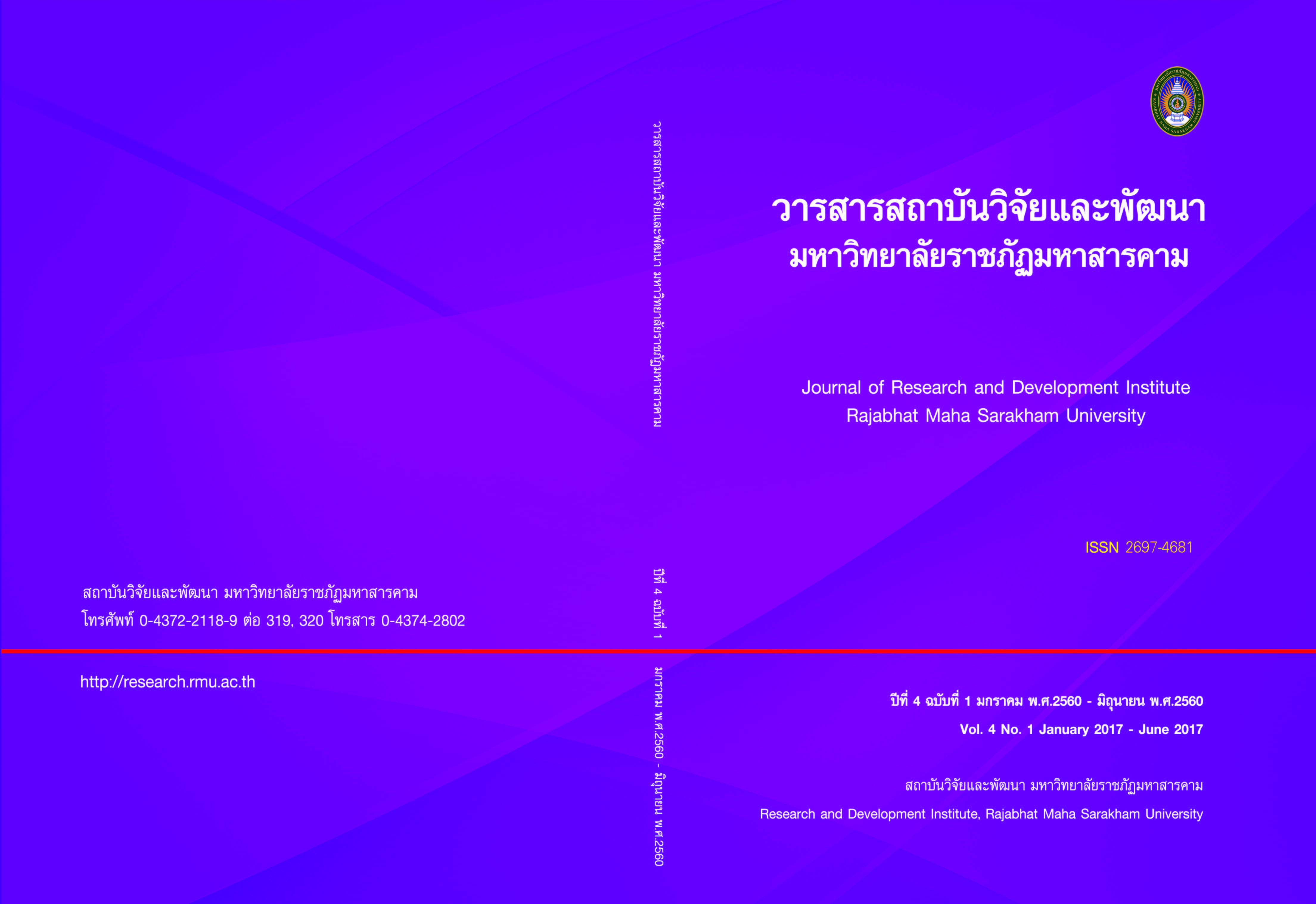Sema : History, Value and Conservation Management of Buddhist Organization in Buriram Province
Keywords:
History, Value, Management Buddhist Arts conservationAbstract
This research aims (1) to study history and artistry of Sema in Buriram Province, (2) to study value of Sema in Buriram Province, and (3) to study the conservation of Buddhism organization in Buriram Province. The results of research were found that;
1. Sema in Buriram Province are history and art, it has been found that some of marble dates from the Dvaravati period and create in Khmer colonial power, created by concept of faith. The reason for creation is used as vision or mark to determine the boundaries of temple according to beliefs and respects. In other hand, to survey of documents and field in 10 areas, found the ancient cliffs of Ban pakram, the ancient parish in many Dvaravati period more than 50 pieces, some piece has clear pattern and start sequel which need to accelerate conservation. 2. The value of leaves in Buriram is plaque that shows importance of Buddhism, thus, it is used as landmark for religious ceremonies clarity, historical values, nationalism, faith, faith and artistic aesthetics. 3. Management of birch conservation in Buriram Province found that the temple which owns area where billiard is located to conservation of ancient cliffs, therefore, the conservation of Buddhist organizations is not driven as it should be. However, to promoted the conservation of ancient pottery namely ; (1) the facade shows the history of the bill, (2) make the big label publicity story about Sema, (3) make brochure, (4) register Sema, (5) label description, (6) have lecturer or few instructors, (7) training stakeholders, (8) educating in Sema ancient along with understanding the conservation of the lake, and (9) donate money was 10,000.00 baht for the head of the community and the abbot of the temple to conserve and do activities to promote Sema continually.
References
กรมการศาสนา. (2014). พระไตรปิฎก ฉบับหลวง 2514. กรุงเทพฯ: โรงพิมพ์การศาสนา,
กรมศิลปากร. (2533). วิวัฒนาการพุทธสถานไทย. กรุงเทพฯ : กรม,
น ณ ปากน้ำ. (2516). สถูปเจดีย์ในประเทศไทย. กรุงเทพ ฯ : กรุงสยามการพิมพ์.
พิทยา บุนนาค, (2551). เสมา สีมา หลักสีมาในศิลปะไทยสมัยอยุธยาช่วงหลังเสียกรุงครั้งแรกถึงครั้งหลังและกรุงธนบุรี. กรุงเทพ ฯ : สำนักงานกองทุนสนับสนุนการวิจัยร่วมกับโรงพิมพ์สำนักงานพระพุทธศาสนาแห่งชาติ,
มหาจุฬาลงกรณราชวิทยาลัย. (2539). พระไตรปิฎก ภาษาไทย.ฉบับมหาจุฬาลงกรณราชวิทยาลัย.กรุงเทพ ฯ : โรงพิมพ์มหาจุฬาลงกรณราชวิทยาลัย.
มูลนิธิมหามกุฏราชวิทยาลัย. (2541). ธรรมบท ภาษาไทย. กรุงเทพ ฯ : โรงพิมพ์มหามกุฏราชวิทยาลัย,
ราชราชบัณฑิตยสถาน, (2546). พจนานุกรมฉบับราชบัณฑิตยสถาน พ.ศ.2542. กรุงเทพ ฯ : นานมีบุ๊คส์พับลิเคชั่นส์,
รุ่งโรจน์ ธรรมรุ่งเรือง, (2558). ใบเสมา ทวารวดีในอีสาน. กรุงเทพ ฯ : สำนักพิมพ์มติชน,
ศรีศักร วัลลิโภดม. (2519). “อิสานระหว่างพุทธศตวรรษที่ 12-16” เมืองโบราณ. (ตุลาคม-ธันวาคม 2519.
ศรีศักร วัลลิโภดม. (2542). เมืองโบราณ : การสืบสานอารยธรรมสยามประเทศ. กรุงเทพ ฯ : สำนักพิมพ์เมืองโบราณ,
ศักดิ์ชัย สายสิงห์. (2547). ศิลปะทวารวดี : วัฒนธรรมพุทธศาสนายุคแรกเริ่มในดินแดนไทย. กรุงเทพฯ : เมืองโบราณ,
สมเด็จพระมหาสมณเจ้า กรมพระยาวชิรญาณวโวรส (2521). วินัยมุข เล่ม 3. กรุงเทพฯ : มหามกุฎราชวิทยาลัย
สำนักโบราณคดี กรมศิลปะกากร กระทรวงวัฒนธรรม. (2550). ศัพทานุกรม โบราณคดี. สำนักโบราณคดี กรมศิลปากรกระทรวงวัฒนธรรม
อรุณศักดิ์ กิ่งมณี. (2539). “ใบเสมาสลักภาพ สุวรรณกักกฎชาดก จากวัดโนนศิลาอาสน์วราราม”. วารสารไทยเมืองโบราณ, 22 (4) : ตุลาคม – ธันวาคม 2539 : 123-128.
Downloads
Published
How to Cite
Issue
Section
License
Articles that are published are copyrighted by the authors of the articles







